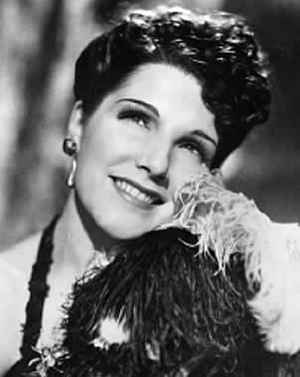


Libertad Lamarque
Source: Cultura Ya
Born in Rosario, Santa Fe, Argentina on 24 November 1908, tango and popular vocalist, Libertad Lamarque, was among the biggest names in Latin film and television, also releasing a firm number of recordings. She was named Libertad because her father was an imprisoned anarchist at the time of her her birth. Having won a stage competition at age seven, she later joined a group of street singers to tour regionally. Her first professional role was in the stage show, 'Madre Tierra' in 1923. She was such a popular local performer that she gained the attention of a journalist who recommended her to the National Theatre in Buenos Aires. Her family didn't only support her career, but moved to Buenos Aires to be with her even before she'd been hired, which she was, her debut in 'La Muchacha de Montmartre' as a choir singer.
Lamarque was soon singing for Radio Prieto, then to record her first tracks, 'Gaucho Sol' (matrix BAVE-910) and 'Chilenito' (matrix BAVE-911), in latter 1926 toward Victor 79711. Todo Tango [ref] has her getting paid a flat fee of 150 pesos for those.
'Chilenito' Tonada by Libertad Lamarque
Recorded summer 1926 in Buenos Aires Matrix BAVE-911
Issued on Victor 79711
Composition: Agustín Irusta
'Botellero' Tango by Libertad Lamarque
Recorded summer 1926 in Buenos Aires Matrix BAVE-991
Issued on Victor 79750
Music: Antonio Sureda / M. Pomar Rivero Lyrics: Juan Durán-Vila
'La Chica del 17' Libertad Lamarque
Recorded autumn 1929 in Buenos Aires Issued on Victor 47199
Music: Fernández Boixader / José Ruiz de Azagra Lyrics: Juan Durán-Vila
'Lagrimas de Arraba' Tango by Libertad Lamarque
Recorded winter 1929 in Buenos Aires Issued on Victor 80969
Music: José D. Pecora Lyrics: Luis Rubistein
Lamarque had signed on to some thousand performances of 'El Conventillo de la Paloma ('The Tenement of the Dove')' in 1929, then toured Argentina and Paraguay as a singer accompanied by a trio of guitarists. Her first appearance in film is thought to have been 'Adiós, Argentina' released on 12 March 1930. That was a silent film with a soundtrack, continuing to record numerously as the calendar rolled into the thirties. Lamargue's next film, released in 1932, was '¡Tango!'. That was the first sound motion picture in Argentina. In the meantime she continued to record numerously as the calendar tolled into the thirties.
'El Niño de las Monjas' Libertad Lamarque
Recorded autumn 1930 in Buenos Aires
Take 2 issued on Victor 47555 / 47739 / 32796 / 47712
Composition: Manuel Font y de Anta
'Canto a Mi Nena' Libertad Lamarque
Recorded Oct-Nov 1931 in Buenos Aires Matrix BAVE-66541
Issued on Victor 37113
Music: Pedro Vettori Lyrics: Libertad Lamarque
'La Paloma' Libertad Lamarque
Recorded Oct-Dec 1931 in Buenos Aires Matrix BAVE-66556
Composition: Sebastián Yradier
Lamarque attempted suicide in 1935 upon jumping from a hotel window in Chile, her fall broken by awning. DAHR picks up sessions again in 1937.
'Dimelo al Oido' Libertad Lamarque
Issued on Victor 37551-7444 1934
Composition: Francisco Lomuto
'Uno' Libertad Lamarque Film: 'El Fin de la Noche' released 11 Jan 1944
Filmed in Argentina Composition: Enrique Santos Discépolo / Mariano Mores
Lamarque decided to tour Cuba in 1946. Hugely popular there, she performed at the Municipal Amphitheatre in Havana for 20,000 fans, then appeared at Carnegie Hall in New York City the next year. Perhaps that tour presented language problems, for it's said she turned down film offers from Hollywood for inability to speak English. Mexico, on the other hand, was a melting pot like the United States when it came to absorbing Latin musicians. Lemarque made two films that were released in 1947 in Mexico, 'Gran Casino' and 'Soledad', then decided to stay there. One reason may have been that Mexico's film industry was technologically advanced beyond Argentina's.
'El Dia Que Me Quieras' ('The Day You Love Me') Libertad Lamarque
Film: 'Musica de Siempre' released latter 1955
Filmed in Mexico Composition: Carlos Gardel
After a string of films Lemargue toured about the Caribbean and South America in the fifties, also recording a number of albums in Cuba. The sixties found her back in Argentina making films, then Mexico:
'Nostalgias' Libertad Lamarque
Film: 'El Hijo Pródigo' released 1 July 1969
Filmed in Mexico Composition: Juan Carlos Cobián
Lamarque's first role in a soap opera was in Venezuela in 1972 on the program, 'Esmeralda'. (Soap operas, incidentally, began to appear on radio in the United States in the early thirties. They were sponsored by soap manufacturers like Colgate-Palmolive, Lever Brothers and Procter & Gamble.) From the latter seventies through the nineties Lemarque added various awards to her resume, also publishing her autobiography, 'Libertad Lamarque', in Spanish in Buenos Aires in 1986 (Javier Vergara Publishing). She died in Mexico City on 12 December 2000 [obit]. Together with numerous appearances in theatre, Lemarque had made 21 films in Argentina, 45 in Mexico and one in Spain. She had starred in six soap operas and recorded more than 800 songs [Wikipedia].
Sources & References:
croomet (Last.fm)
(notes)Audio: Internet Archive
Filmography:
Musical Genres Performed by Lamarque:
Recordings:
Cats / Discos:
Sessionographies:
Further Reading:
Other Profiles:
Classical Main Menu Modern Recording
hmrproject (at) aol (dot) com